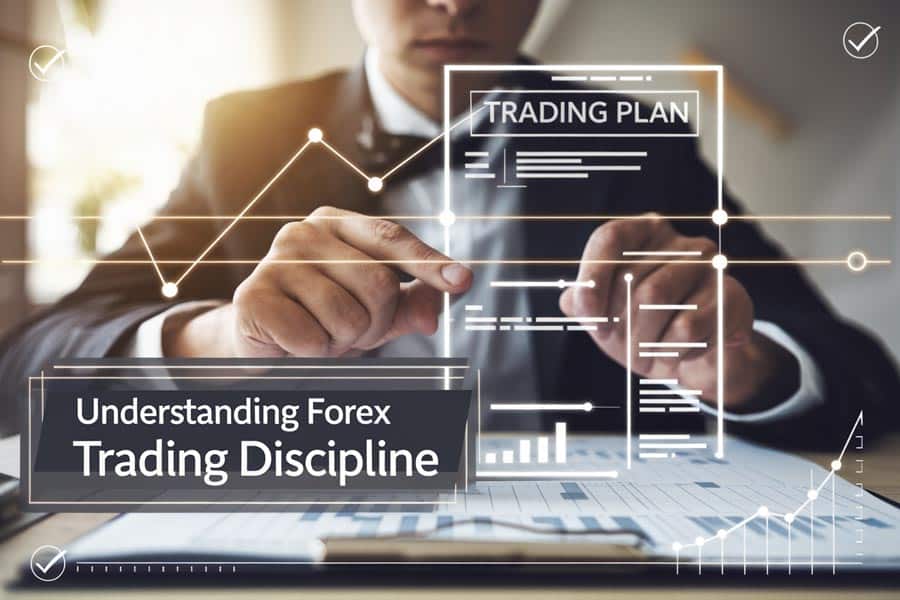Imagine waking up every morning confident that your trading strategy will yield consistent profits, regardless of market volatility. This isn’t just a dream—forex trading discipline can turn it into reality. In the high-stakes world of forex trading, discipline isn’t merely a beneficial trait; it’s the essential foundation for achieving and sustaining profitability. Without it, even the most promising trading plans can crumble under emotional decision-making and impulsive actions. This comprehensive guide delves into the core aspects of developing and maintaining discipline in forex trading, providing you with actionable strategies to enhance your trading performance. Whether you’re partnering with a regulated forex broker or navigating the markets independently, mastering trading discipline is your pathway to consistent success.

Ready to transform your trading approach and unlock the secrets to disciplined, profitable forex trading? Let’s dive in and explore the indispensable elements that will elevate your trading game.
Understanding Forex Trading Discipline
Forex trading discipline is the unwavering commitment to adhering to a structured trading plan and maintaining emotional control, regardless of market fluctuations or external pressures. It’s about making informed, rational decisions based on predefined strategies rather than succumbing to fear, greed, or other emotions that can cloud judgment. Discipline in forex trading is not just about following rules; it’s about cultivating a mindset that prioritizes long-term success over short-term gains.

Gain a Deep Understanding of Forex Trading Discipline and Its Impact on Your Trading Success.
The Pillars of Trading Discipline
- Consistency: Applying your trading strategy uniformly across all trades.
- Patience: Waiting for optimal trade setups and avoiding impulsive decisions.
- Emotional Control: Managing emotions to prevent them from influencing trading decisions.
- Accountability: Taking responsibility for your trading actions and outcomes.
Understanding these pillars is crucial for any trader aiming to achieve consistent profitability in the forex market.
Importance of Discipline in Forex Trading
1. Minimizing Emotional Trading
Emotions like fear and greed are natural but can be detrimental to trading success. Discipline helps mitigate these emotions by enforcing a structured approach to trading. According to a study by the University of California, traders who adhere to disciplined strategies are 30% more likely to achieve long-term profitability compared to those who trade based on emotions.
2. Protecting Your Capital
Effective risk management is a direct outcome of disciplined trading. By setting strict risk parameters and sticking to them, you safeguard your capital against significant losses. This protection is vital for sustaining your trading activities over time.
3. Building Consistency
Consistency in applying your trading strategies leads to more predictable outcomes. This reliability is key to developing a sustainable trading career, as it allows for better performance tracking and strategy refinement.
4. Enhancing Decision-Making
Disciplined traders rely on data and analysis rather than intuition. This objective approach leads to more accurate and effective trading decisions, increasing the likelihood of profitable trades.
Developing a Solid Trading Plan
A robust trading plan is the blueprint for disciplined trading. It outlines your trading goals, strategies, risk management rules, and daily routines. Here’s how to create an effective trading plan:
Defined Trading Goals
Set clear, achievable objectives that align with your risk tolerance and financial aspirations. Goals could range from daily profit targets to long-term wealth accumulation.
Risk Management Rules
Establish rules for position sizing, stop-loss orders, and maximum daily loss limits. These rules help prevent significant losses and ensure you stay within your risk tolerance.
Preferred Trading Strategies
Document specific strategies, including the indicators you use, entry and exit criteria, and the types of trades you will execute. Whether you prefer scalping, day trading, or swing trading, having a defined strategy is crucial.
Trading Schedule
Adhere to a regular trading routine to maintain focus and avoid burnout. Consistency in your schedule helps reinforce disciplined trading habits.
Pro Tip: Regularly review and update your trading plan to adapt to changing market conditions and improve your strategies.
Risk Management Techniques Every Trader Must Know
Effective risk management is the backbone of forex trading discipline. Implementing these techniques will protect your capital and enhance your trading longevity:
Position Sizing
Determine the size of each trade based on your total account balance. A common rule is to risk no more than 1-2% of your account on a single trade. This approach minimizes the impact of any one loss on your overall capital.
Stop-Loss Orders
Always set stop-loss levels to limit potential losses. A stop-loss order automatically closes your position at a predetermined price, preventing further losses if the market moves against you.
Risk-Reward Ratios
Aim for a minimum risk-reward ratio of 1:2. This means that for every unit of risk, you target two units of profit. A favorable risk-reward ratio ensures that profitable trades outweigh losing ones, contributing to overall profitability.
Diversification
Avoid concentrating all your capital in a single trade or currency pair. Diversifying your trades reduces the risk of significant losses and enhances the stability of your trading portfolio.
Regular Risk Assessments
Continuously evaluate your risk exposure and adjust your strategies accordingly. This proactive approach helps you stay aligned with your risk management rules.
Controlling Emotions in Trading

Learn Strategies to Control Emotions and Maintain Composure for Successful Forex Trading.
Emotional control is paramount in maintaining forex trading discipline. Emotions like fear and greed can lead to irrational decisions that undermine your trading strategy. Here are effective strategies to manage emotions:
Use Automation
Utilize trading bots or automated systems to execute trades based on predefined criteria. Automation removes emotional bias, ensuring that trades are executed consistently and objectively.
Practice Mindfulness
Incorporate mindfulness techniques such as meditation or deep breathing exercises into your daily routine. These practices help calm your mind, reduce stress, and enhance focus during trading sessions.
Stick to Your Plan
Trust your trading plan and avoid deviating from it based on market noise or external pressures. Adhering to your plan reinforces disciplined trading behaviors and prevents impulsive decisions.
Set Realistic Expectations
Avoid setting unrealistic profit targets that can lead to excessive risk-taking. Realistic goals help maintain emotional stability and prevent the frustration that comes from unmet expectations.
Pro Tip: Keep a journal to track your emotional states during trading and identify patterns that may affect your performance.
Read More: Overtrading in Forex
The Role of Patience in Forex Trading
Patience is a crucial component of forex trading discipline. It involves waiting for optimal trade setups and avoiding the temptation to enter trades prematurely. Patience allows traders to capitalize on high-probability opportunities rather than chasing the market.
Benefits of Patience
- Improved Trade Quality: Waiting for the right setups increases the likelihood of successful trades.
- Reduced Stress: Patience minimizes the pressure to constantly trade, leading to a more balanced trading experience.
- Better Risk Management: Patience ensures that you are not overexposed to the market by limiting unnecessary trades.
Tips for Practicing Patience
- Set Alerts: Use price alerts to notify you of potential trade setups, allowing you to step away from the screen and wait for confirmation.
- Limit Trades: Restrict the number of trades you execute each day or week to focus on quality over quantity.
- Avoid Overtrading: Stick to your trading plan and avoid the urge to trade excessively, which can lead to burnout and increased risk.
Continuous Learning and Adaptation
The forex market is ever-evolving, and staying informed is essential for maintaining forex trading discipline. Continuous learning and adaptation ensure that your strategies remain effective in changing market conditions.
Strategies for Ongoing Education
- Market Analysis: Regularly read market analysis and updates to stay informed about economic events and trends.
- Advanced Trading Courses: Enroll in courses that offer in-depth knowledge of trading strategies, technical analysis, and risk management.
- Learn from Successful Traders: Follow and engage with experienced traders to gain insights and learn new techniques.
Adapting to Market Changes
- Review and Adjust Strategies: Periodically assess the performance of your trading strategies and make necessary adjustments based on market conditions.
- Stay Updated: Keep abreast of global economic indicators and geopolitical events that can impact currency movements.
- Embrace Technology: Utilize the latest trading tools and platforms to enhance your trading efficiency and effectiveness.
Pro Tip: Join trading communities and forums to exchange ideas, ask questions, and stay motivated in your trading journey.
Read More: The Mindset of a Successful Trader
Utilizing Trading Journals for Discipline
A trading journal is an invaluable tool for enhancing forex trading discipline. It allows you to systematically track and analyze your trades, helping you identify strengths and areas for improvement.

Discover How Utilizing Trading Journals Can Strengthen Your Forex Trading Discipline and Improve Performance.
Benefits of a Trading Journal
- Performance Analysis: Evaluate the success rate of your trades and the effectiveness of your strategies.
- Pattern Identification: Recognize recurring patterns in your trading behavior that may impact your performance.
- Accountability: Hold yourself accountable for your trading actions and decisions.
What to Include in Your Trading Journal
- Trade Details: Record entry and exit points, trade size, and the currency pair traded.
- Trade Rationale: Note the reasons behind each trade, including technical indicators or fundamental factors.
- Outcome and Profit/Loss: Document the result of each trade and calculate the profit or loss.
- Lessons Learned: Reflect on what worked well and what didn’t, and outline steps for improvement.
Implementing Your Trading Journal
- Consistency: Update your journal after every trade to ensure accuracy and completeness.
- Review Regularly: Set aside time weekly or monthly to review your journal and identify trends or areas for enhancement.
- Set Improvement Goals: Use insights from your journal to set specific goals for improving your trading discipline and performance.
Pro Tip: Use digital trading journal tools that offer analytics and visualization features to streamline the journaling process.
Read More: Trading Psychology in Forex
Avoiding Overtrading
Overtrading is a common pitfall that undermines forex trading discipline. It occurs when traders execute too many trades, often driven by emotions rather than strategic planning. Overtrading can lead to significant losses and burnout.
Dangers of Overtrading
- Increased Transaction Costs: More trades mean higher commissions and spreads, which can erode profits.
- Higher Risk Exposure: Excessive trading increases the likelihood of significant losses.
- Emotional Fatigue: Constant trading can lead to stress and impaired decision-making.
Strategies to Prevent Overtrading
- Adhere to Your Trading Plan: Follow the guidelines set in your trading plan regarding the number and type of trades.
- Set Daily or Weekly Trade Limits: Establish a maximum number of trades to execute within a specific timeframe.
- Take Regular Breaks: Step away from trading after a set number of trades or after experiencing a loss to regain focus and reduce stress.
- Prioritize Quality Over Quantity: Focus on high-probability trade setups rather than attempting to capture every market movement.
Pro Tip: Implement a cooling-off period after a series of losses to prevent emotional trading and overcompensation.
Setting Realistic Goals
Setting achievable and realistic goals is a fundamental aspect of forex trading discipline. Unrealistic expectations can lead to frustration, overtrading, and risky behavior that jeopardizes your trading account.
Why Realistic Goals Matter
- Sustainable Progress: Realistic goals ensure steady and manageable progress towards profitability.
- Enhanced Motivation: Achievable targets keep you motivated and focused on long-term success.
- Reduced Stress: Realistic expectations minimize the pressure and stress associated with unattainable targets.
How to Set Realistic Goals
- Specific and Measurable: Define clear and quantifiable objectives, such as a specific percentage return per month.
- Time-Bound: Assign deadlines to your goals to maintain focus and urgency.
- Aligned with Risk Tolerance: Ensure your goals are compatible with your risk management strategies and overall risk appetite.
- Flexible and Adaptable: Be prepared to adjust your goals based on market conditions and your trading performance.
Examples of Realistic Goals
- Achieve a monthly return of 5-10% with a maximum drawdown of 2-3%.
- Execute no more than 5-10 trades per week to maintain quality.
- Reduce the average loss per trade by implementing stricter stop-loss orders.
Pro Tip: Break down long-term goals into smaller, manageable milestones to track progress and stay motivated.
Read More: The Importance of patience in forex trading
Learning from Mistakes
Mistakes are inevitable in forex trading, but how you respond to them can make the difference between failure and success. Embracing a growth mindset and viewing mistakes as learning opportunities is crucial for maintaining trading discipline.
Benefits of Learning from Mistakes
- Improved Strategies: Analyzing errors helps refine your trading strategies for better performance.
- Enhanced Resilience: Learning from setbacks builds resilience and adaptability in the face of challenges.
- Continuous Improvement: Mistakes provide valuable insights that contribute to ongoing personal and professional growth.
Strategies for Learning from Mistakes
- Detailed Analysis: After each loss, thoroughly analyze what went wrong and identify contributing factors.
- Implement Corrective Actions: Adjust your trading plan and strategies based on the lessons learned to prevent similar mistakes.
- Stay Objective: Avoid blaming external factors or other traders. Focus on what you can control and how you can improve.
- Seek Feedback: Engage with mentors or trading communities to gain different perspectives on your trading performance.
Pro Tip: Incorporate the lessons learned into your trading journal to create a reference for future decision-making.
Maintaining Physical and Mental Health
Your physical and mental well-being directly impacts your ability to maintain forex trading discipline. A healthy body and mind enhance focus, decision-making, and overall trading performance.
Impact of Health on Trading
- Cognitive Function: Proper nutrition and exercise improve cognitive abilities, enabling better analysis and decision-making.
- Stress Management: Good mental health practices help manage stress, reducing the likelihood of emotional trading.
- Energy Levels: Adequate sleep and physical activity maintain high energy levels, ensuring sustained focus during trading sessions.
Strategies for Maintaining Health
- Regular Exercise: Incorporate physical activities such as jogging, yoga, or strength training into your routine to boost energy and reduce stress.
- Balanced Diet: Consume a diet rich in nutrients to support brain function and overall health.
- Adequate Sleep: Ensure you get 7-9 hours of quality sleep each night to maintain mental sharpness and emotional stability.
- Mindfulness Practices: Engage in meditation or deep breathing exercises to enhance mental clarity and reduce anxiety.
- Take Breaks: Schedule regular breaks during trading sessions to prevent fatigue and maintain focus.
Pro Tip: Create a daily routine that balances trading activities with physical and mental health practices to support sustained discipline.
Pro Tips for Advanced Traders
For those who have mastered the basics of forex trading discipline, here are some advanced strategies to elevate your trading performance:
Leverage Advanced Technical Analysis
Utilize sophisticated technical indicators and chart patterns to gain deeper insights into market movements. Advanced analysis can enhance the precision of your trade entries and exits.
Optimize Your Trading Algorithms
If you use automated trading systems, continuously optimize and backtest your algorithms to ensure they adapt to changing market conditions and remain effective.
Incorporate Fundamental Analysis
Blend technical and fundamental analysis to make more informed trading decisions. Understanding economic indicators and geopolitical events can provide a comprehensive view of the market.
Diversify Across Multiple Currency Pairs
Expand your trading portfolio by diversifying across various currency pairs. This reduces risk exposure and increases opportunities for profit across different markets.
Implement Advanced Risk Management Techniques
Explore techniques such as hedging and portfolio balancing to further protect your capital and optimize your risk-reward profile.
Network with Elite Traders
Engage with top-tier trading communities and attend advanced trading seminars to gain exclusive insights and strategies from seasoned professionals.
Pro Tip: Regularly review and refine your advanced strategies to maintain a competitive edge in the forex market.
Opofinance Services: A Trusted Partner in Disciplined Trading
When it comes to executing your disciplined trading strategies, partnering with a reputable broker is essential. Opofinance stands out as a premier choice for traders seeking reliability, advanced tools, and comprehensive support. Here’s why Opofinance should be your go-to forex trading broker:
- ASIC Regulated: Ensures a safe and transparent trading environment, adhering to strict regulatory standards for your peace of mind.
- MT5 Integration: Officially featured on the MT5 brokers list, offering advanced trading tools and a user-friendly platform.
- Social Trading: Leverage the power of social trading by copying successful traders and learning from their strategies, enhancing your own trading discipline.
- Safe and Convenient Deposits and Withdrawals: Enjoy seamless and secure transactions with a variety of deposit and withdrawal methods tailored to your needs.
- Educational Resources: Access a wealth of educational materials, webinars, and tutorials to continuously improve your trading skills and maintain discipline.

Ready to take your trading discipline to the next level? Open an account with Opofinance today and experience unparalleled support and advanced trading services!
Conclusion
Forex trading discipline is the linchpin that holds together all elements of successful trading. From developing a solid trading plan and managing risks effectively to controlling emotions and maintaining physical and mental health, discipline permeates every aspect of a trader’s journey. By embracing disciplined trading practices, you position yourself for consistent profitability and long-term success in the competitive forex market. Leveraging trusted platforms like Opofinance further enhances your ability to execute disciplined strategies, providing the tools and support necessary to thrive. Remember, discipline transforms potential into performance, turning every trading session into a step towards mastery.
Key Takeaways
- Discipline is Crucial: Essential for managing risks, minimizing emotional trading, and achieving long-term success in forex trading.
- Comprehensive Trading Plan: A solid plan with defined goals, risk management rules, and a consistent trading schedule is vital.
- Emotional Control and Patience: Key to making rational decisions and waiting for optimal trade setups.
- Continuous Learning and Adaptation: Staying informed and adaptable ensures your strategies remain effective in changing markets.
- Trusted Brokers Matter: Partnering with regulated brokers like Opofinance provides the necessary support and tools for disciplined trading.
How can I measure my level of discipline in forex trading?
Measuring your trading discipline involves evaluating your adherence to your trading plan, consistency in executing strategies, and your ability to manage emotions. Keeping a detailed trading journal where you record each trade, your decision-making process, and emotional state can help assess and improve your discipline over time.
What are the signs of a disciplined forex trader?
A disciplined forex trader consistently follows their trading plan, manages risk effectively, maintains emotional control, and demonstrates patience by waiting for high-quality trade setups. They also engage in continuous learning and regularly review their trading performance to make necessary adjustments.
Can discipline compensate for a lack of trading knowledge?
While discipline is essential, it cannot fully compensate for a lack of trading knowledge. Successful trading requires both a disciplined approach and a solid understanding of market dynamics, strategies, and risk management. Combining discipline with comprehensive trading education leads to the best outcomes.







